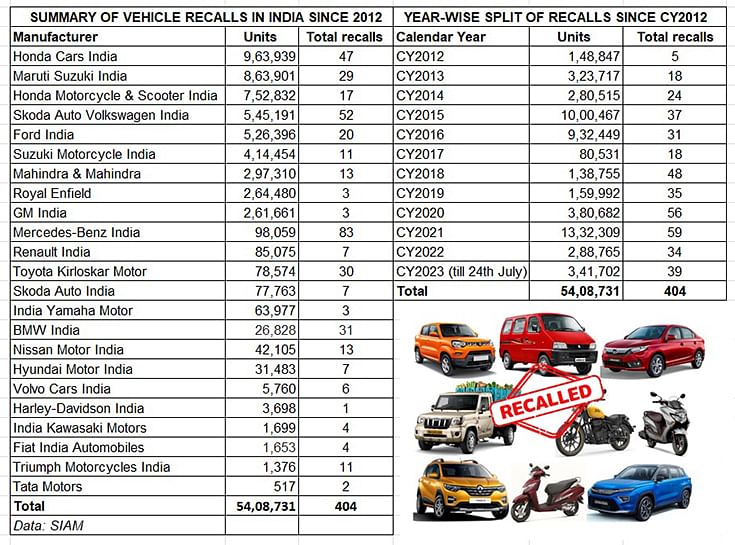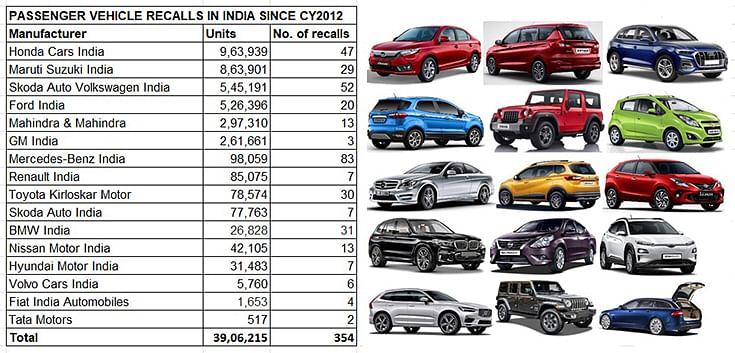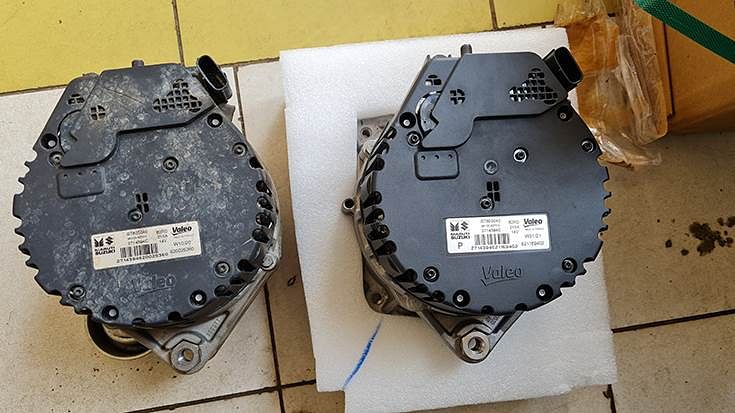Car and bike OEMs in India recall 5.4 million vehicles since 2012
In what is a sign of a maturing market with increased awareness about vehicle safety and customer satisfaction, OEMs in India are voluntarily recalling their vehicles to inspect and rectify defects. Since July 2012, 3.90 million four-wheelers and 1.5 million two-wheelers have been recalled in India.
On July 24, Maruti Suzuki India recalled 87,599 S-Presso hatchbacks and Eeco vans to inspect them for a possible defect in a part of the steering tie-rod, which could affect vehicle steerability and handling. This was Maruti’s fourth recall in the year to date (January-July 24 2023) and its third largest since apex industry body SIAM’s Code of Voluntary Recall came into effect in July 2012.
This latest recall sees the total number of recalled two- and four-wheelers in the first seven months of 2023 at 341,702 units over 39 individual instances. The biggest has been Suzuki Motorcycle India’s recall of 160,025 UB125 (Suzuki Burgman) BS VI scooters on April 11, 2023 for a rust-proofing service exercise on the fuel tank.
In the year to date (January to July 27, 2023), seven OEMs – four car and SUV manufacturers and three two-wheeler makers – have recalled vehicles:
- Maruti Suzuki India (4 recalls comprising 123,351 units)
- Mercedes-Benz India (19 recalls comprising 23,952 units)
- Skoda Auto India (6 recalls comprising 6,317 units across the Ducati, Audi and Porsche brands)
- Toyota Kirloskar Motor (3 recalls comprising 5,968 units of the Urban Cruiser Hyryder and Glanza)
- Suzuki Motorcycle India (4 recalls comprising 179,635 units of the Burgman scooter, GSX 150F and GSX1300R Hayabusa motorcycles)
- Honda Motorcycle & Scooter India (1 recall for 2,398 CB300Rs)
- Triumph Motorcycles India (2 recalls comprising 81 units of the Bonneville and Speed Triple 1200)
The date of manufacture of the vehicles recalled this year ranges from CY2004 (2,401 units of the Mercedes-Benz C-Class produced from April 15, 2004 to February 28, 2008) through to CY2023 (1,942 units of the Toyota Urban Cruiser Hyryder and Glanza manufactured from December 8, 2022 to January 12, 2023 or the Maruti S-Presso and Eeco produced from July 5, 2021 through to February 15, 2023).
 CY2021 saw over 1.3 million vehicles – 13,32,309 units comprising 892,604 two-wheelers and 439,705 passenger vehicles – recalled.
CY2021 saw over 1.3 million vehicles – 13,32,309 units comprising 892,604 two-wheelers and 439,705 passenger vehicles – recalled.
With five months of CY2023 left for the year to close, cumulative recalls in January-July period have surpassed CY2022’s 288,765 units. Interestingly, the biggest recall last year was also of the Suzuki Burgman – 160,025 units on July 15, 2022 – due to “inadequate number of drain holes in rear fender” on the units manufactured between January 21, 2020 and December 16, 2021. The second biggest recall last year was by Skoda Auto India for 72,235 cars and SUVs (Rapid, Fabia, Octavia, Kodiaq, Yeti and Superb), manufactured between 2013 and 2018, to inspect the front airbag.
Over 1.5 million two-wheelers recalled
A deep dive into SIAM’s industry statistics reveals that a total of 54,08,731 vehicles or 5.40 million units, across 404 separate instances, have been recalled over the past 11 years (see SIAM vehicle recall data table above). They comprise 39,06,215 passenger vehicles (72% of total recalls to date) and 15,02,516 two-wheelers (28% of total recalls to date).
Since July 2012, a total of 23 OEMs – 16 carmakers and seven two-wheeler manufacturers – have been involved in this exercise. The highest number of recalls in a single calendar year were in CY2021 – over 1.3 million vehicles – 13,32,309 units comprising 892,604 two-wheelers and 439,705 passenger vehicles – being voluntarily recalled by their manufacturers in India and accounting for 25% of the cumulative 5.40 million two-wheeler and passenger vehicles recalled in India till now.
 Two-wheelers account for 28% of the total vehicle recalls in India to date. HMSI, with 752,832 units, accounts for exactly 50% of 15,02,516 total units recalled.
Two-wheelers account for 28% of the total vehicle recalls in India to date. HMSI, with 752,832 units, accounts for exactly 50% of 15,02,516 total units recalled.
Let’s take a closer look at some of the OEMs which have successfully conducted recalls over the past 11 years, starting with two-wheelers.
Honda Motorcycle & Scooter India has the largest recalls – 752,832 units, exactly 50% of the total 15,02,516 two-wheelers recalled. HMSI’s first recall was in November 2012 for 11,506 CBR 250s to check for limited ineffectiveness in front brake application. The most recent one was in April 2023 for 2,398 CB300Rs as Honda had identified a manufacturing defect in the right crankcase cover of the engine. HMSI’s biggest recall – and possibly India Auto Inc’s – was in May 2021 for 615,566 units of the Activa 5G/6G/125, CB Shine, CB 300R, H'ness CB 350, X Blade and Hornet to check and replace the reflex reflector.
Suzuki Motorcycle India, with 414,454 units, accounts for 27% of two-wheeler industry recalls. The first of 11 recalls was on July 11, 2016 for 54,740 Access 125 scooters. The reason given was “heat treatment in rear axle shaft was improper. Few shafts main have high hardness which may lead to breakage of threaded portion.” Its most recent was on April 11, 2023 for 160,025 UB125 (Suzuki Burgman) BS VI scooters for a rust-proofing operation on the fuel tank.
Royal Enfield has effected three recalls totalling 264,480 bikes till now. The first was for 8,514 Bullet 350s (to check the torque) in May 2019. Two years later, in May 2021, RE recalled 229,657 units comprising 229,657 units of the Classic 350 EFI and Meteor 350. The reason cited was “a defect in the ignition coil of motorcycles, caused by a minor mix up at our suppliers' end to the manufacturing period between December 2020 and April 2021. This defect could cause probable misfiring, reduced vehicle performance, and in rare cases, an electric short circuit. The issues can occur while motorcycle engine is running.” Then, on December 20, 2021, the company recalled 26,309 Bullet Classic 350s to sort out an issue with single-channel ABS, rear drum brake models, manufactured between September 1,2021 and December 5, 2021.
Similarly, India Yamaha Motor has had three recalls totalling 63,977 units – 56,082 Ray scooters in July 2013, 138 R1s in March 2014 and 7,757 FZ 150s in December 2019.
Harley-Davidson India and Triumph Motorcycles India, both of which are in the news for their recent launches of new midsized bikes, have also seen recalls. H-D India, in August 2015, recalled 3,698 XG 750s for resolving the issue of a “poor fuel pump inlet which could lead to interruption of fuel supply at low fuel levels. The motorcycle may hesitate and restore power abruptly leading to loss of control.”
Triumph’s recall history in India is for 1,376 bikes, the most recent being in March 2023 for 32 Bonnevilles. The reason cited was “Internal Investigations have identified the need to replace the damper that sits between the front wheel and the left-hand brake disc along with disc bolts to avoid detachment of disc from the front wheel assembly.”
India Kawasaki Motors has recalled 1,699 bikes on four occasions, twice for the Ninja ZX-10R, and once for the Ninja 300 and Z900.
Carmakers in India recall over 3.9 million units
Of the 39,06,215 cars, SUVs and MPVs recalled since July 2012, Honda Cars India, with a total of 963,939 units, is the OEM with the largest four-wheeler recalls through 47 instances. While the first was in June 2013 for 42,672 City sedans to solve the issue of melting of the power window master switch, the biggest one for the Japanese carmaker was in July 2016 for 137,270 units of the City to inspect and rectify an issue with the passenger side airbag deployment.

Given that brand Honda – two- and four-wheelers combined – accounts for a total of 17,16,771 units or 31% of total vehicle recalls till date in India, reflects just how high the Japanese automaker’s focus is on vehicle safety.
Passenger vehicle market leader Maruti Suzuki India with 863,901 units with the one with the second-highest four-wheeler recalls, the first of 29 instances coming on November 26, 2013 for 1,492 units of the Swift, Swift Dzire, Ertiga and the A-star to conduct a check for “unapproved steering column assembly.”
 In September 2021, Maruti Suzuki India voluntarily replaced the ISG unit accompanying the mild-hybrid system in the XL6, Ciaz, Ertiga, Brezza and S-Cross.(Photo: Shashi Shekher Mishra)
In September 2021, Maruti Suzuki India voluntarily replaced the ISG unit accompanying the mild-hybrid system in the XL6, Ciaz, Ertiga, Brezza and S-Cross.(Photo: Shashi Shekher Mishra)
Maruti’s biggest recall was in September 2021 for 181,754 Ciaz, Ertiga, XL-6, Breeza and S-Cross models to check for a possible defect in the Motor Generator Unit (MGU), due to water entry in the electrical circuitry which could result in short circuiting. The second largest was in July 2020 for 134885 Wagon Rs and Balenos for fuel pump motor malfunction, leading to engine stopping or not starting. The third-largest recall was earlier this month for the S-Presso and the Eeco van.
Skoda Auto Volkswagen India takes third place on the list of recalls because it covers multiple brands like Skoda, Audi, VW, Porsche, Lamborghini and Ducati. The 52 instances include 25 for Audi, 10 for Porsche, seven for VW, three each for Lamborghini and Skoda and one Ducati. The bulk of the recalls were on January 6-7, 2016 for 88,719 Skoda cars (Fabia, Rapid, Laura, Superb, Yeti) and 198,294 Volkswagens (Polo, Vento, Jetta, Passat), all for software updates on the cars equipped with common-rail diesel engines (Type EA 189).
At fourth position in the four-wheeler recall list, with 526,396 units, is Ford India, which has now ceased manufacturing operations in India. GM India, which has also quit India, is ranked sixth with 2,61,661 units.
Mahindra & Mahindra has, since July 2012 and 13 instances, recalled a total of 297,310 vehicles starting with 24,695 XUV500s on March 6, 2013 because of oil seepage from a hose that leads to gradual increase in steering effort. The XUV500 was also subjected to the company’s largest recall as yet – 99,283 units on February 12, 2015 – to check for the likelihood of an intermittent fault code that might inhibit deployment of the side curtain airbag. M&M’s last recall, as per SIAM data, was for 29,878 Bolero Pikups. The reason cited was that “a fluid pipe in the engine compartment may be routed improperly leading to excessive stretch, resulting in fluid leakage, which will lead to the Fluid Level Warning Indicator (FLWI) coming ON in the instrument cluster.”
Maturing market, sharper focus on safety, stiff fines a deterrent for OEMs
SIAM’s exhaustive data on the subject of voluntary vehicle recalls makes for good number-crunching. Of the total 23 OEMs listed, 16 are PV manufacturers and seven are two-wheeler makers. While two – GM and Ford – have completely exited India, Harley-Davidson has handed over retail operations to Hero MotoCorp.
Of the total 54,08,731 vehicles recalled in India to date, 39,06,215 units or 72% constitute PVs and the balance 15,02,516 units or 28% comprise two-wheelers. While SIAM's voluntary recall code has paved the way to a structured vehicle recall exercise in India, the operation got another charge in April 2021. The Ministry of Road Transport & Highways (MoRTH) has, effective from April 1, 2021, mandated stiff fines, which go up to Rs 1 crore, on vehicle manufacturers (detailed below).

The policy states that if a certain number/percentage of vehicles is found to have the same defect/issue, the OEM will need to compulsorily recall the vehicles. The decision for vehicle recall is based on two key factors – the number of complaints received for a defect on a vehicle and the annual sales of that particular vehicle. MoRTH has outlined different thresholds for each vehicle categories to ensure that defective products are recalled by the OEMs in due time. The rules define defects as a fault in the vehicle / component / software that poses or may pose undue risk to road safety or environment. The policy is applicable to vehicles that are less than seven years old from the date of manufacture or import.
Proactive approach to recalls pays off
Even as the quality of Indian vehicles, as well as made-in-India automotive components, continues to improve year on year, as seen also in the growing domestic and export sales numbers, vehicle recalls also reflect Indian OEMs’ proactive efforts to address technical issues in their vehicles, as is the industry practice in developed markets worldwide.
Furthermore, given the growing consumer consciousness about vehicle safety and buyer preference for safer vehicles in the country, OEMs are increasingly proactive about issuing a recall and undertaking remedial measures by contacting the impacted vehicle owners, informing them of the recall procedure and conducting the exercise. Enhanced customer satisfaction as a result of the OEM initiative, ususually free of cost, also has a positive rub-off on the brand which is critical in the hugely competitive Indian two- and four-wheeler market.
In earlier interactions with Autocar Professional on the subject of vehicle recalls, industry leaders have voiced the importance of being completely transparent about any possible quality or technical defects in vehicles. Market analysts, however, are of the opinion that while one-off recall events may be perceived positively by customers as a reflection of continued customer care from an OEM, repeated issues from the same maker are likely to shake the confidence of existing customers and prospective buyers.
As Autocar says, recalls are a sad fact of automotive life. Despite exhaustive testing and daunting development budgets, defects in vehicles still get revealed only after thousands of examples encounter the real world, away from the development tracks and computer simulations. With the Indian government putting its shoulder behind the wheel of increased safety awareness, and a marked shift amongst consumer towards buying safer vehicles, OEMs are proactively recalling their vehicles to have remedial work carried out, almost always at the cost of the original manufacturer, not the consumer. It’s a safety-catch for automotive.
All in all, the onus remains on OEMs and their supplier ecosystem to continually sharpen the focus on quality and ensure the products entering the market are ‘first-time-right’, which in turn positively impact both consumer and market sentiment.
Vehicle recall data: courtesy SIAM
All images used are representational
RELATED ARTICLES
TVS Motor: The New King of India's Electric 2-Wheeler Market
January 2026 sees TVS Motor solidify its position with 34,558 units Bajaj struggles to keep pace.
Electric PV Sales Stabilize after GST Hit
Fresh FADA data shows January 2026 registrations surging 55% year-on-year, with Tata, JSW MG, and Mahindra all posting s...
Bajaj Chetak production plunges by 47% in July due to shortage of rare earth magnets
Bajaj Auto manufactured 10,824 Chetaks last month, 9,560 fewer units than the 20,384 Chetaks produced in July 2024. As a...






 28 Jul 2023
28 Jul 2023
 29626 Views
29626 Views





 Angitha Suresh
Angitha Suresh


 Arunima Pal
Arunima Pal

 Ajit Dalvi
Ajit Dalvi

